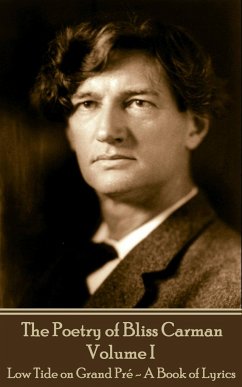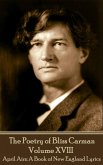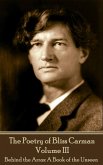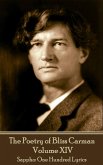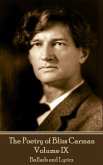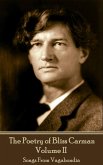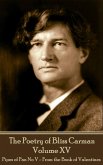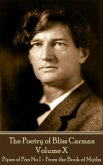William Bliss Carman was born in Fredericton, in New Brunswick on April 15th 1861. He was educated at Fredericton Collegiate School before moving to the University of New Brunswick, obtaining his B.A. there in 1881. As is common with so many writers his first published piece was for the University magazine and for Carman that was in 1879. After several years editing various magazines and periodicals Carman first published a poetry volume in 1893 with Low Tide on Grand Pré. There was no Canadian company prepared to publish and when an American company did so it went bankrupt. The following year was decidedly better. His partnership with the American poet Richard Hovey had given birth to Songs of Vagabondia. It was an immediate success. That success prompted the Boston firm, Stone & Kimball, to reissue Low Tide on Grand Pré and to hire Carman as the editor of its literary journal, The Chapbook. Carman brought out, in 1895, Behind the Arras, a somewhat more serious and philosophical work centered on the premise of a long meditation, using the speaker's house and its many rooms, as a symbol of life and the choices to be made. In 1896 Carman met Mrs Mary Perry King, who rapidly became patron, adviser and sometime lover. She also became his writing collaborator on two verse dramas. In 1897 Carman published Ballad of Lost Haven, and in 1898, By the Aurelian Wall, the title poem itself was an elegy to John Keats and the book was a collection of formal elegies. As the century turned Carman was hard at work on a five-volume set of poetry "Pans Pipes". The excellence of a number of these poems did much to install Carman as the most noted of Canadian Poets and eventually their own Poet Laureate. In 1912 the final work in the Vagabondia series was published. Richard Hovey had died in 1900 and so this last work was purely Carman's. It has a distinct elegiac tone as if remembering the past works themselves. On October 28th, 1921 Carman was honored by the newly-formed Canadian Authors' Association where he was crowned Canada's Poet Laureate with a wreath of maple leaves. William Bliss Carman died of a brain hemorrhage at the age of 68 in New Canaan on the 8th June, 1929.
Hinweis: Dieser Artikel kann nur an eine deutsche Lieferadresse ausgeliefert werden.
Hinweis: Dieser Artikel kann nur an eine deutsche Lieferadresse ausgeliefert werden.

